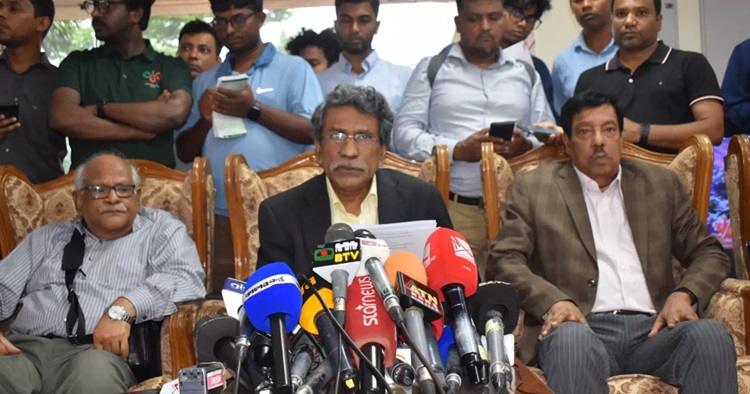Reform talks: no consensus on women’s seat election, upper house formation


Political parties have failed to reach an agreement over two issues discussed in Monday's reform talks ---the election system for 100 women seats in the parliament and the election system for the upper house of the proposed bicameral parliament.
“Since the issues still remain unsettled, the commission thinks it is appropriate to resolve them before proceeding further,” said vice chair of the National Consensus Commission (NCC) Prof Ali Riaz.
He made the remarks at a press briefing in the afternoon on the conclusion of the 12th day of the second-round dialogue between the commission and the political parties at the Foreign Service Academy in the capital.
Prof Ali Riaz said most of the parties agreed earlier on raising the women's seats from 50 to 100 in parliament and the formation of a bicameral parliament –- the lower house and the upper house. But they couldn’t reach an agreement yet over the (election) systems regarding the two issues, he said.
Since the two unresolved issues will be discussed on Tuesday, the caretaker government topic has been deferred for another day, he said.
BNP has pushed for a seat-based proportional representation (PR) system for electing members to both the 100 women seats and the 100-member Upper House. In contrast, Bangladesh Jamaat-e-Islami demanded a vote-based PR system for both cases.
Women seats:
The consensus commission on Monday placed a revised proposal regarding the women seat election that the political parties that would contest in at least 25 constituencies must ensure minimum one-third women of their total candidates.
In the original proposal, the commission earlier said 100 women shall be elected from 100 constituencies, exclusively reserved by rotation for women candidates.
However, many political parties don’t support the revised proposal as well.
BNP Standing Committee Member Salahuddin Ahmed at a press briefing said his party proposed increasing the number of reserved women seats from 50 to 100. “But we think the existing election system should continue in this regard,” he said.
He said the commission’s revised proposal was “extremely difficult to implement” under the country’s socio-political realities, religious traditions and cultural norms.
“Due to religious and cultural reasons, women's direct participation remains difficult. We want gradual progress. A time will come when women can contest directly for these seats, and we should wait for that,” said Salahuddin.
Bangladesh Jamaat-e-Islami Nayeb-e-Ameer Syed Abdullah Muhammad Taher said that Jamaat supports raising the number of women seats to 100. “We’ve asked the election for the seats should be the vote-based PR system,” he said.
He said if direct elections are held, a woman would have to contest in an area roughly equal to three normal constituencies. It is almost impossible in the country’s social, religious and cultural reality, said the Jamaat leader
The upper house formation:
The consensus commission placed two proposals for the formation of the upper house (Senate).
According to the first proposal, political parties will nominate 100 (one hundred) candidates for the election to the Upper House based on the Proportional Representation (PR) system.
BNP and several other parties don’t support this proposal though most of the political parties including Jamaat and NCP are in favour of this PR system for the upper house.
As per the alternative proposal, each district and each city corporation area shall be considered/demarcated as a single regional constituency of the Upper House and one representative of the Upper House shall be elected from each constituency by direct vote of the people (currently there are 64 districts and 12 city corporations in the country, so the number of seats in the Upper House will be 76).
No political party particularly BNP and Jamaat supported the alternative proposal.
Salahuddin Ahmed said his party proposed the formation of a bicameral parliament but didn’t propose any direct election for the upper house of the prospective bicameral legislature.
When his attention was drawn that NCP alleged several particular parties want a weak and ineffective upper house, he said BNP was the first to propose a bicameral legislature nearly two years ago. “So the question of weakening or strengthening doesn’t arise. The house hasn’t even been formed yet. How can one say whether it will be weak or strong?” he asked.
Syed Abdullah Muhammad Taher said two-thirds of political parties had already expressed support for the PR system, and on Monday, a few more parties backed it.
“We have strongly endorsed the voter-based PR system,” he said.
If the commission truly reflects the opinions of the parties fairly, their decision must favour the PR system, he added.
Jamaat’s Caretaker Proposals
On Monday, Jamaat also submitted a new proposal and two alternative proposals to the consensus commission on the caretaker government issue.
Raising the proposal, the Jamaat leader said there shall be a search committee composed of the Prime Minister, the Leader of the Opposition and the Chief Justice in a bid to select the chief of the caretaker government. This search committee would invite nominations—five from the ruling party, five from the opposition, and two from each of the other parties represented in parliament.
The search committee would select the head of the caretaker government by consensus from the nominees.
